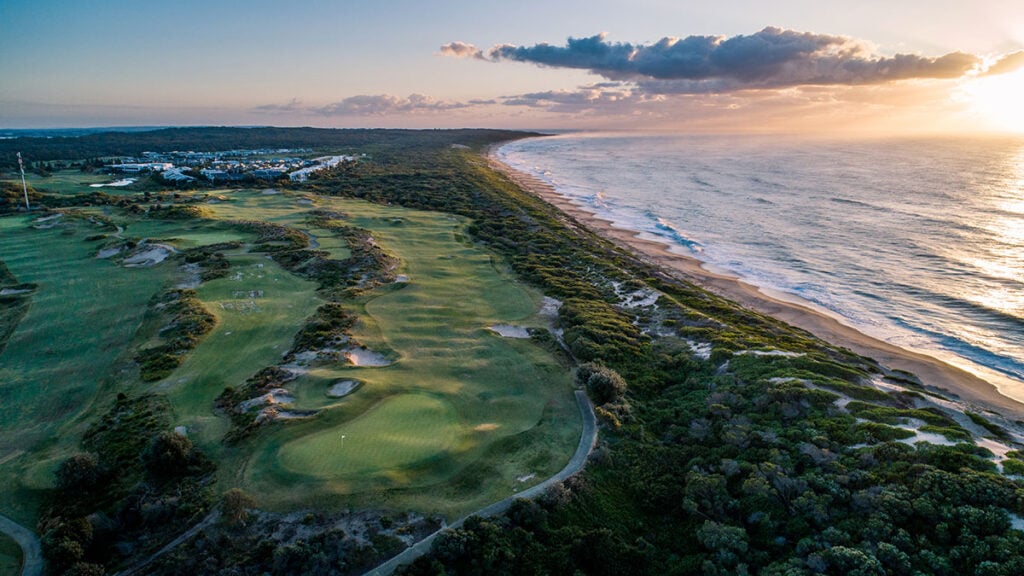For many golfers, golf carts were the initial lure to the game. Mum and/or Dad played golf, but their kids were far more interested in getting behind the wheel. Over time, those kids became golfers and replenished the cycle.
Regardless of your view on golf carts, there’s no doubting how deeply they have innovated our game. Golf carts revolutionised the way we play and who can play, as well as providing a much-needed revenue stream for pro shops.
Club Car is the most recognisable brand in the golf cart industry, but many may not know the company is headquartered right near the world’s most recognisable golf course: Augusta National Golf Club. Australian Golf Digest recently caught up with Club Car’s vice-president of golf business development and industry relations, Fred Palmer. Palmer has been with Club Car for more than three decades. He has seen vast changes in the industry, and will continue to oversee many more.

“I’ve used my 33 years with the company to open up doors and help industries drive business,” Palmer says. “I work with superintendents, golf pros and club managers to learn more about what’s going on from those on the front line. We’re lucky to be involved in such a wonderful sport.”
Australian Golf Digest: How did Club Car’s connection with Augusta, Georgia, start?
Palmer: “It’s a two-part story. Our major competitor, E-Z-Go, started here in the 1950s. Club Car was actually a Texas-based company that a local (Augusta) gentleman bought and brought over here in the late ’50s. Club Car was not home-grown, it was imported into Augusta. In 1978, eight gentleman who worked for E-Z-Go left, found some investors and purchased Club Car.”
How much of a connection has Club Car forged with the Masters and Augusta National over the years?
“Well, you know what? For Club Car, that is our week in the sun. People obviously come from all over the world to attend the Masters, so we use that week to host people, do plant tours, organise dinners and, of course, play some golf. It’s a huge week for business and we try to get people visiting to spend a little time with us.”
Is Club Car one of the major employers in the area?
“Yes. Augusta is right near the South Carolina border, but it’s predominantly on the Georgia side. There are two counties: Richmond and Columbia. We’re one of the largest businesses in Columbia County. We’re probably one of the top three employers in the county for manufacturing.”
Let’s localise it a little for our readers. How important has the relationship been with the Australian golf industry and the Oceania region?
“Australia is a big market for us and a very important one. It’s amazing how many Australians come over for the Masters. In the business, we call it the ‘Aussie invasion’ [laughs]. My Australian colleague, Kevin Gates, is always gathering the influencers, the decision makers, the distributors and the press during Masters week, to really leverage that time. Your country is well represented that week [laughs].”
What are some of the trends Club Car has noticed within Australian golf over the years?
“I think golf globally has its hotspots. Some are trying to figure out, let’s call it the ‘new world order’, of golf. People are pressed for time and the younger folks like doing lots of little things in bites and bits. I see Australia as being very similar to the United States in the sense that driving revenue to the golf clubs and getting players to play remain challenges we try to overcome all the time. In Australia, like the US, there are those clubs that will probably never have any trouble with economics. Then there are clubs fighting for memberships and looking at innovative ways to keep their business going. It’s no different to the American golf industry.”
What has Club Car and the golf cart industry achieved that you are particularly proud of?
“The economics of the golf car are what keeps a lot of the business going in our game. If you think about what a golf club profits from a fleet of golf cars, in many cases it is the difference between being right side up and upside down, financially. I look at carts as complementing golf. There are players who need to ride in golf carts, and there are some who love to walk. In my regular group of golf buddies, some of us love to ride and some walk every time. I think golf carts are something clubs must have to continue to function.”
Where do you see golf carts over the next two decades?
“From a very high level, I think you would have to look at what’s available in technology in other industries. We are sort of a trailing industry, so technology that’s perfected and used in other markets and industries golf tends to adapt later. Like lithium iron batteries – they have been around for quite some time, yet they are only starting to come into golf. You’ll see more of them in golf carts in the near future. I see a couple of other things advancing in golf carts soon: I see the continued evolution of GPS technology, management tools, software and customer service growing considerably.
Many golfers admit their first experience in golf was driving the golf cart for their parents, but then they ended up falling in love with the game themselves. Do you see golf carts as an overlooked catalyst for growing participation?
“That’s a good question. I think of many young children who have gone with their parents out to the golf course and what started as getting their parents snacks at the shop turned in to a lifelong obsession with golf. In a very simple way, I see your point that a golf cart does that for the game.
In the US, we have a product called 4Fun. We haven’t commercialised it in Australia just yet. But really, it is a family vehicle that everybody rides in and it has four bags. It creates this different feeling of community. If you’re riding in two golf cars, or all four in a group are walking, you might not interact that much. But the 4Fun allows for more interactions across 18 holes than a regular two-passenger would. It’s also a great vehicle for ladies and juniors to go out and have lessons with the golf pro. In all of our designs, we’re always asking ourselves, ‘How can this help the business of golf?’”
Do you see golf carts as helping to shorten the time it takes to play golf?
“There’s no question. I think long-term success for golf means offering a section of the market that is delivered in bits and bites. If somebody only has time to play four holes, we can’t just force them to play nine or 18. We have to figure that out. If you’ve only got two hours in the morning – and that includes getting to the golf course and you can only play for an hour and 15 minutes – that’s better than not coming at all. I don’t think we need to be so bound by the nine or 18 number. Obviously, tours and competitions are a whole different arena. But I think in the business of trying to attract new golfers, we have to be more flexible how they digest the game. Who knows exactly how we can do it? We need to keep thinking. A golf cart can allow a golfer to play four holes of an existing course that doesn’t necessarily have loops back to the clubhouse. Do we need to price it in the number of holes played before 10am? Maybe. We need to be more creative in how we price golf.”



